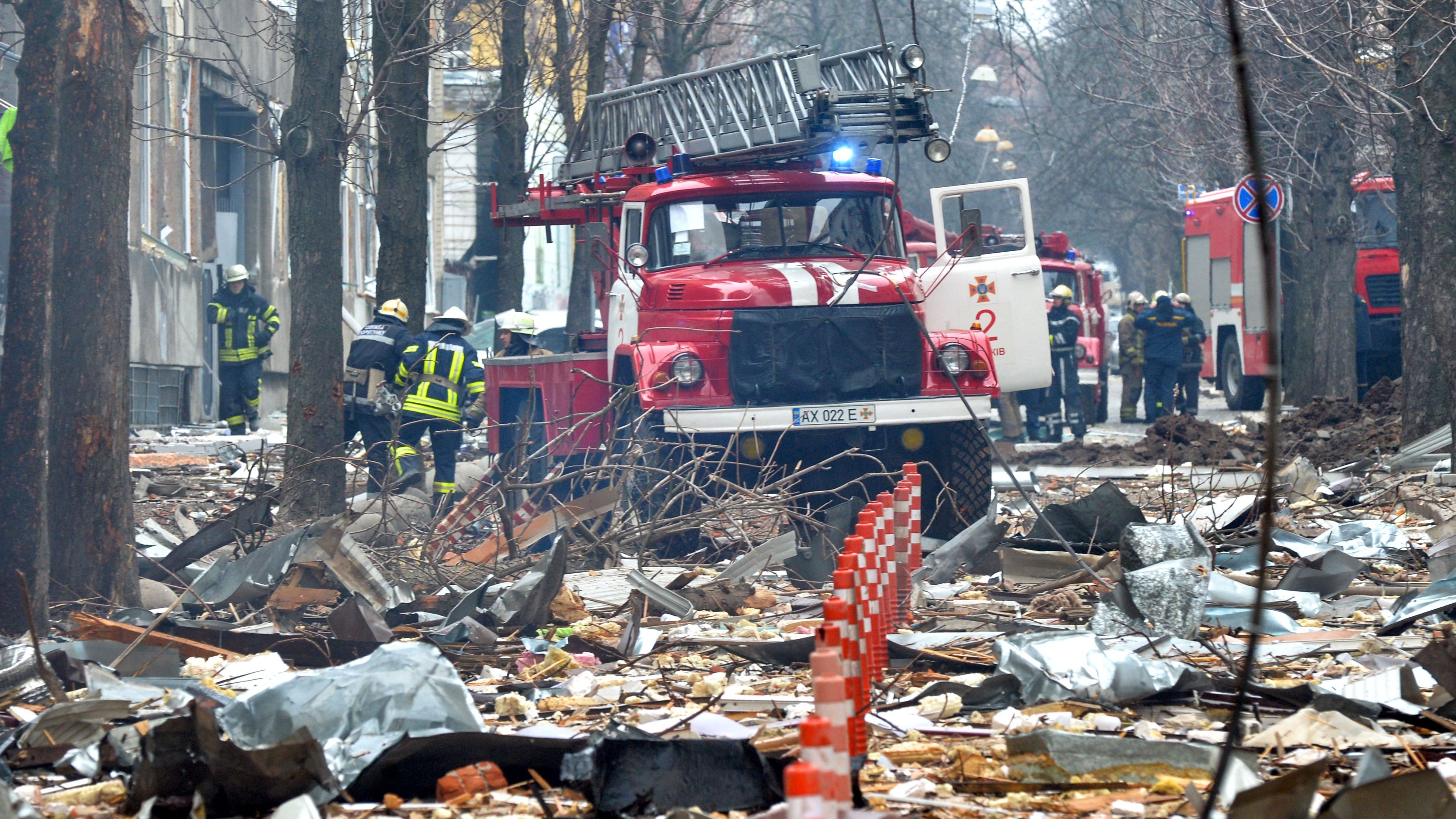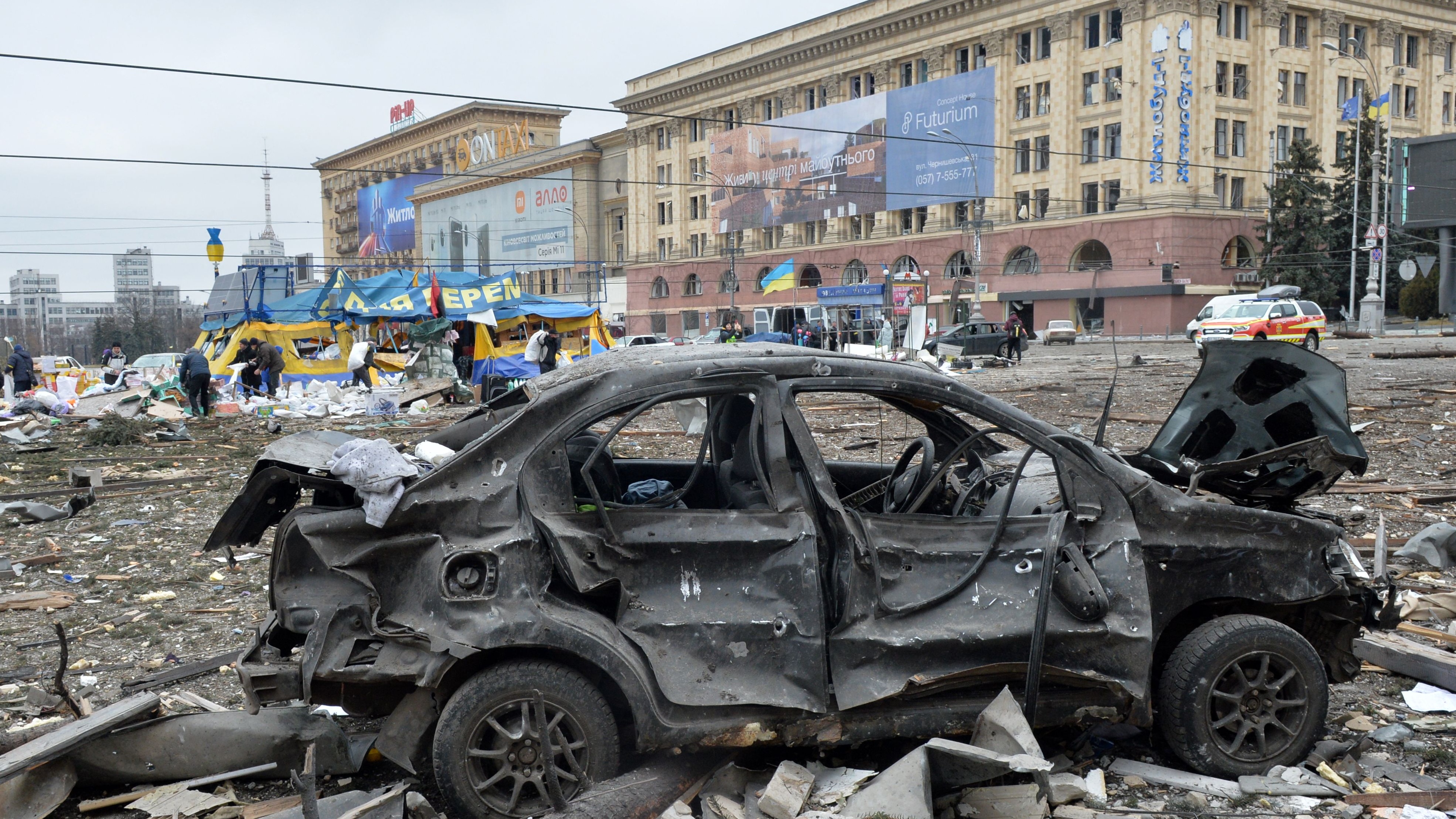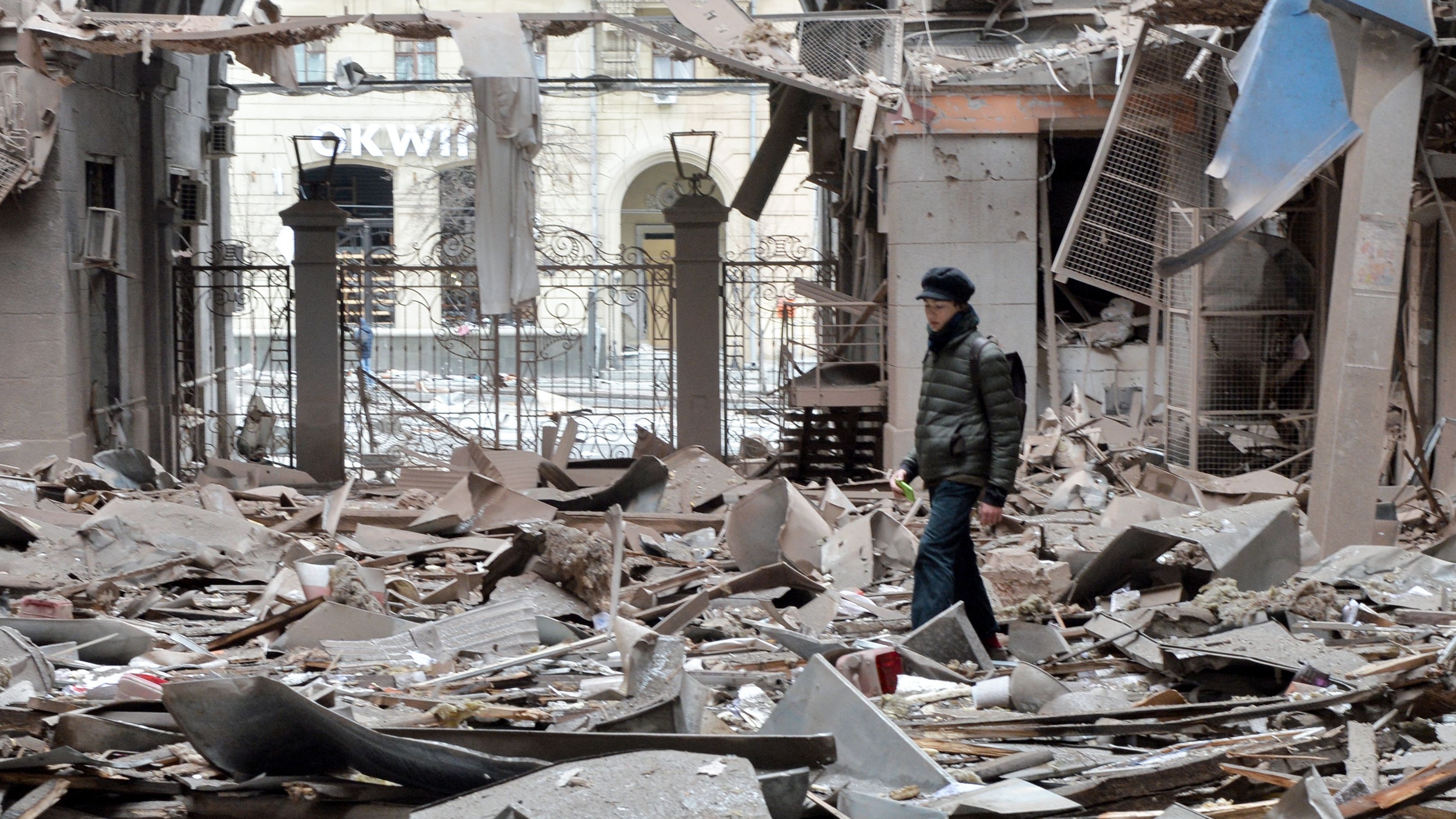Inside Kharkiv: the city paying ‘hideous cost’ of Ukraine war
Ukraine’s second city has so far ‘borne the brunt’ of Russia’s bombardment

A free daily email with the biggest news stories of the day – and the best features from TheWeek.com
You are now subscribed
Your newsletter sign-up was successful
Images and testimony from inside Ukraine’s second-largest city have revealed the extent of the destruction left behind by Russia’s aerial assault on civilian areas.
The northeastern city of Kharkiv, home to 1.4m people, has “borne the brunt of Moscow’s firepower” since Vladimir Putin gave the order for a full-scale invasion, Al Jazeera reported. “Streets after streets have been destroyed” by heavy Russian shelling, with footage from broadcaster’s team on the ground showing “rubble, bomb craters and twisted steel”.
The Times’ war correspondent Anthony Loyd reported that “in Kharkiv’s hospitals, the faces of war are sculpted by flying glass and burning shrapnel”, with women “adorned in stitches, their skin coloured in bruises”, as “wounded children stare up from their beds, listless with pain and trauma”.
The Week
Escape your echo chamber. Get the facts behind the news, plus analysis from multiple perspectives.

Sign up for The Week's Free Newsletters
From our morning news briefing to a weekly Good News Newsletter, get the best of The Week delivered directly to your inbox.
From our morning news briefing to a weekly Good News Newsletter, get the best of The Week delivered directly to your inbox.
“Better than any military map, it is their mutilated skin and ripped flesh that best charts the progress of the Russian campaign” to occupy the city, he continued. “Under attack from air strikes, surface-to-surface missiles and artillery fire”, the push to seize Kharkiv has “spiralled from military thrust into a punitive bombardment”.
A city destroyed
Writing for the London Evening Standard from within the besieged city, Glib Mazepa, a former special correspondent at the now closed Kyiv Post newspaper, said Kharkiv “has experienced one of the harshest attacks during this war among the Ukrainian cities”.
Russian troops have entered the city only once and “were smashed by our army within a couple of hours”, he continued. But they have been using “weaponry firing from a distance”, resulting in “merciless destruction of the residential areas on the city’s north side”.
Mazepa added: “Enemy aircraft drop bombs and rockets on to the parts that are not reachable by other means. The central Svobody (Freedom) square, one of the largest in Europe, resembles WWII footage after being targeted by a rocket attack.”
A free daily email with the biggest news stories of the day – and the best features from TheWeek.com

Al Jazeera correspondent Charles Stratford said: “It’s an absolutely shocking scene of destruction and misery. I am struggling to find words.
“This street in central Kharkiv shows just how devastating the effect of Russian bombing of this city has been. An entire street totally destroyed. Many of these buildings have people’s homes in them. Some of them are still smoking.
“One of the main things that people here tell you is that they can in no way understand how a leader of a country like Russia could do something like this to a city like Kharkiv.”
The New York Times said that Russian bombing has also “devastated the city’s downtown core”, gutting Kharkiv National University, the second-oldest university in Ukraine. According to The Times, “regional administration buildings in Freedom Square have taken the brunt of Putin’s offensive”.
Speaking to The Washington Post, Kharkiv’s Mayor Igor Terekhov warned invading Russian forces that “there is no question over whether the city will give up”.
Terekhov has seen his city turned from a “thriving metropolis” to “a dystopian war zone” in less than two weeks, the paper said. Russia’s military “has unleashed aircraft, artillery and missile attacks on Kharkiv’s residential districts and civilian infrastructure, wantonly escalating a campaign of random death and destruction”.
Terekhov said: “They are destroying entire districts, where lots of people live. They just want to destroy and demolish the city.
“This is a pure example of a genocide, the genocide of the Ukrainian nation.”
‘Come and check on us Putin’
The bombs and shells have continued to fall on Kharkiv, despite widespread claims that civilians there are being killed indiscriminately.
On Sunday night, during a city-wide blackout, “Russian jets roared low overhead, bombing targets that lit the darkness in fireballs, as buildings shook with repeated explosions”, said The Times’ Loyd. The following morning, he saw “two victims of the jets’ bombs, a teenage boy and a 44-year-old woman, in a resuscitation unit”.
Irena Sydorenko, 35, who suffered shrapnel wounds and a dislocated pelvis after “a Russian rocket detonated under her fifth-floor apartment”, told Loyd that those in the city are “just waiting for Putin to come to Kharkiv’s streets to discuss how much his army is making an effort to avoid killing civilians”.
“Come and check on us here, Vladimir Putin. See how accurate your artillery is,” she said.

Al Jazeera reported that “many people have been hiding in underground metro stations, where the young and old stand patiently in line for soup, salad and bread served by volunteers”. Others are trying to leave on trains “heading towards the western cities of Lviv, Ternopil and Ivano-Frankivsk”, Mazepa said in the London Evening Standard.
The trains “are leaving constantly”, with people “packed in them as densely as sardines in a can”, he wrote. But there is not space for everybody trapped inside the city.
“The Ukrainian army will fight to the end,” Mayor Terekhov told The Washington Post. “They are our heroes. They are fighting with their own weapons on their own land. They will not give up.”
And “even among the pain and fear”, there is “still a place for stoicism and dark humour”, said Loyd in The Times.
A married couple, Oleg and Victoria Ilchinskyi, told him that their “balcony disappeared in an instant” and “windows blew in upon us in a storm of blast and heat” when a Russian rocket hit their apartment.
Minutes later, their daughter called from Brussels to check that they were safe.
“So I took the call covered in blood in the street,” Victoria said, “our home obliterated behind us, dust and smoke everywhere, glass sticking out of my skin, barely able to stand.”
But she “took a deep breath, gathered myself and said: ‘Don’t worry darling, everything is just fine here.’”
-
 Why are election experts taking Trump’s midterm threats seriously?
Why are election experts taking Trump’s midterm threats seriously?IN THE SPOTLIGHT As the president muses about polling place deployments and a centralized electoral system aimed at one-party control, lawmakers are taking this administration at its word
-
 ‘Restaurateurs have become millionaires’
‘Restaurateurs have become millionaires’Instant Opinion Opinion, comment and editorials of the day
-
 Earth is rapidly approaching a ‘hothouse’ trajectory of warming
Earth is rapidly approaching a ‘hothouse’ trajectory of warmingThe explainer It may become impossible to fix
-
 Will increasing tensions with Iran boil over into war?
Will increasing tensions with Iran boil over into war?Today’s Big Question President Donald Trump has recently been threatening the country
-
 Putin’s shadow war
Putin’s shadow warFeature The Kremlin is waging a campaign of sabotage and subversion against Ukraine’s allies in the West
-
 Epstein files topple law CEO, roil UK government
Epstein files topple law CEO, roil UK governmentSpeed Read Peter Mandelson, Britain’s former ambassador to the US, is caught up in the scandal
-
 Iran and US prepare to meet after skirmishes
Iran and US prepare to meet after skirmishesSpeed Read The incident comes amid heightened tensions in the Middle East
-
 Which way will Trump go on Iran?
Which way will Trump go on Iran?Today’s Big Question Diplomatic talks set to be held in Turkey on Friday, but failure to reach an agreement could have ‘terrible’ global ramifications
-
 Israel retrieves final hostage’s body from Gaza
Israel retrieves final hostage’s body from GazaSpeed Read The 24-year-old police officer was killed during the initial Hamas attack
-
 China’s Xi targets top general in growing purge
China’s Xi targets top general in growing purgeSpeed Read Zhang Youxia is being investigated over ‘grave violations’ of the law
-
 Panama and Canada are negotiating over a crucial copper mine
Panama and Canada are negotiating over a crucial copper mineIn the Spotlight Panama is set to make a final decision on the mine this summer